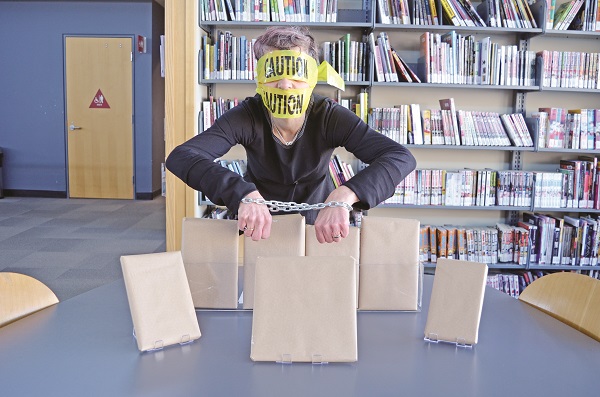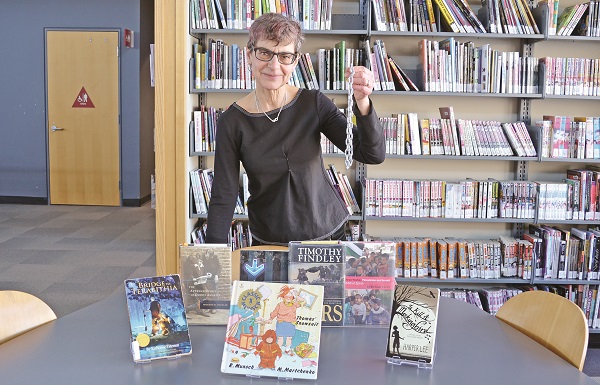General News » News
Savour some “forbidden fruit” during Freedom to Read week
February 22, 2017 · 0 Comments

By Brock Weir
What are the first images that come to mind when you think about the freedom to read?
Chances are you have images of banned – or burned – books going through your mind, but as the world evolves, so too does the concept.
Sunday, February 26 marks the start of Freedom to Read Week and the Aurora Public Library (APL) is encouraging you to pick up a story someone else has tried to keep from you. In this day and age, however, freedom to read goes well beyond a book which may or may not be on a shelf.
“We used to just talk about Freedom to Read in terms of books, but now we’re really talking about Freedom of Expression,” says APL’s Reccia Mandelcorn. “The whole concept has gone beyond straight books and into journalism and into the internet. We’re really talking about Freedom of Information.
“For libraries, publishers and authors, it I primarily books, but with journalism with everything that is going on in the news these days, and the fact communication extends beyond book form now, it is a much larger issue. For me, it is an expression of our freedoms to be able to communicate, to be able to enjoy within the limits of the law, but we also have to be very wary, especially in this day and age, of an agenda that takes away freedoms possibly within the law.”
Each year around this time, Ms. Mandelcorn says she celebrates Freedom to Read Week “by reading somebody wanted to keep away from me,” but if you don’t know where to start in terms of finding a story someone wanted to keep away from you, APL has put together a good primer.
In the showcase near the main entrance to the Library, visitors can see a vast selection of books that were, at one time or another, challenged at libraries and school boards across Canada.
One such volume is “The Wars” by Timothy Findlay which, despite racking up numerous prestigious awards, was challenged for its depiction of war, brutality and sex. Another, Mordecai Richler’s “The Apprenticeship of Duddy Kravitz” faced challenges due to “vulgar expressions and sexuality in the text.”
Some challenged books might surprise you.
If you think everyone enjoys the books by renowned Canadian children’s author Robert Munch? Think again. According to Ms. Mandelcorn, he is a contender for one of the most challenged Canadian authors out there.
A seasonal favourite, “Thomas’ Snowsuit” received a couple of complaints because it shows Thomas standing up to his principal and, in a novel twist, because “it promoted cross-dressing.”
Close to home, Deborah Ellis’ book “Three Wishes: Palestinian and Israeli Children Speak” received a challenge at the York Region District School Board and was removed from school libraries. In response, the APL stocked up.
“They felt that talking about children in the middle of war was too violent and too political for children, but how are we going to teach children about the importance of working towards peace and understanding what someone on the other side is going through if we don’t talk to them?” says Ms. Mandelcorn. “That is one of the fabulous things about books: we’re able to use books as a tool to generate conversation, and what better place than in a library, or in the classroom or at home?”
With uncertainty in so many parts of the world, Ms. Mandelcorn says Freedom to Read Week is more relevant than ever.
“My big fear is in many countries we are seeing a very right wing agenda,” she says. “We have been very complacent in Canada. We haven’t had real book banning, but we have had challenges. We have had very supportive arts groups and literary groups and, for the most part, our governments have been quite supportive. When we look at the world around us, do we really sit back and say we’re pretty free with expression?”
Recently, APL received an email from the Canadian Federation of Library Associations asking them, among others, to report back on any attempts they have encountered with regards to censorship and challenges. This year, the call included censorship towards materials, resources, services, policies, disputes over internet access, meeting rooms, guest speakers, exhibits, and “anything that prevents or restricts access to freedom.”
“This is the first time I have ever seen it written out so expansively,” she says. “To me, it is a wakeup call for all of us that we need to cherish what we have worked for and we can’t be complacent and let it slip away.”












